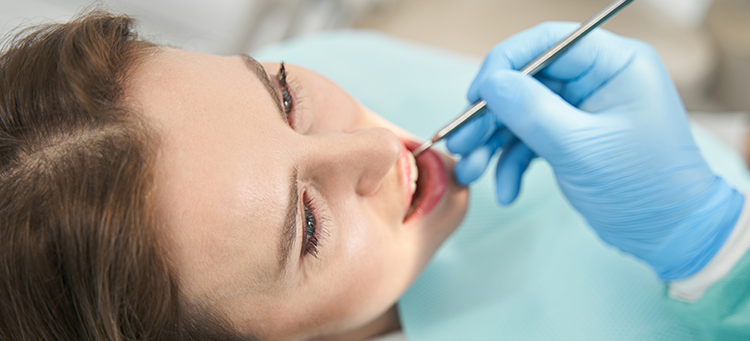For many vapers, when it's time for a visit to the dentist, the question, can a dentist tell if you vape, may surface. Whether you have recently switched to vaping, or if you have been vaping for a while, if you are wondering, will the dentist know if I vaped once? The answer is probably yes - it is likely that your dentist will be able to tell if vape.
Dentists are trained experts in oral healthcare, and many have years of experience in their field. As professionals who specialise in dentistry, they provide oral health services, and are there to help care for your teeth and mouth.
While vapes do not contain tar, nicotine is still present in most vapes and e-liquids. When nicotine is exposed to oxygen, it can turn yellow, which could impact teeth.
"Oral or dental health has been researched more extensively than other health areas. However, the quality of the studies was often low. Recent reviews concluded that vaping would be detrimental to oral or dental health among people who have never vaped or smoked but would likely be beneficial for smokers switching. We found no studies that would change that conclusion."
The UK Government Nicotine Vaping in England 2022 Evidence Update Summary
Long-term vaping may contribute to oral health issues such as dry mouth - a factor which may easily be detectable. It is therefore likely that a dentist will quickly be able to identify and spot the signs of long-term vaping.
Your dentist or hygienist will likely provide you with some guidance information during your visit, to help you look after your teeth between dental appointments.
Does Vaping Stain Teeth?
So why do teeth stain? There are plenty of common reasons why teeth can discolour over time. Unfortunately, with age, our teeth will gradually become darker over time through natural staining. There are different types of teeth stains, and colours can range from yellow to brown. Many stains will occur when something comes into contact with the surface of your teeth. Some of the main factors that contribute to teeth staining are things we all do every day. From what you eat and the types of food you consume, to drinking too much tea or coffee which contains caffeine, and drinking red wine. All of these factors are all known to contribute to tooth stains.
As most vapes contain nicotine - an addictive substance - vaping can still be considered a contributing factor to teeth staining. While the buildup of stains will depend on the amount of usage, one way to restrict the amount of exposure to nicotine - and therefore potentially limit staining - is to be mindful of the amount you are vaping.
What Do I Need to Know About the Effects of Vaping on Teeth?
While there is only limited available research conducted over a substantial period of time, vaping is thought to be less harmful to oral health overall than continued smoking. Adult smokers looking to go smoke-free due to the direct result of cigarette staining on their teeth, might consider vaping as an alternative to smoking that doesn't impact teeth in the same way. To understand the effects of vaping with and without nicotine, more research is needed to properly determine whether vaping can contribute to serious oral issues, such as greater susceptibility to problems like gum disease, compared to an adult who does not.
Vaping and Oral Health - Benefits of Switching to Vaping
The British Dental Association (BDA) acknowledges that the harms caused by vaping are less than smoking. Many dentists support the UK Government's aims for Britain to go smoke-free. 1 As Mark Armstrong, Chair of the British Dental Association's Health and Science Committee says, "With oral cancer issues on the rise, dentists will only welcome aspirations for Britain to go smoke-free." The UK Government itself 2 understands that more vaping is an effective tool for helping people stop smoking.
For adult smokers who want to know about the benefits of switching to vaping, it is likely that these users will want to know what happens to your teeth when you stop smoking and start vaping. When switching to vaping from continued smoking, the effects of vaping on the teeth may be less than that of cigarettes. Unlike smoking, due to the absence of tar and ash, the potential for staining may be far less than that of continued smoking.
It is the belief of NHS England that much of the harm from smoking comes from the many thousands of other toxic chemicals found in tobacco smoke, which vapes do not contain.3 However, The British Dental Association is clear that the effects of vaping on the teeth are still relatively unknown.4
A clinical observation study by the Tecnologica Research Institute shows that the results from a selection of adult users who swapped continued smoking for vaping demonstrates ˜valid support toward a clear improvement in some specific oral health parameters."5
The best choice an adult smoker can make is to stop smoking and avoid nicotine use entirely. However, switching to vaping could, overall, be a better choice than continuing to smoke cigarettes.
The Impact of Smoking on Teeth
Just one of the impacts of smoking is its significant contribution to teeth staining. For smokers, the tar and nicotine present in cigarettes can affect teeth - making them yellow quickly. Over time, smoking tobacco leads to continued staining, and can cause teeth to turn brown. You may even have heard long-term smokers groaning about their teeth turning brown.6
Many smokers understand the significance continued smoking can have - not only on their body, but their general health. Smoking is also known to have an effect on the following oral health issues:6
- Bad breath
- Loss of taste and smell
- Buildup of plaque on the surface of teeth
- Reduction of blood supply (to the mouth)
In some cases, oral health problems for smokers can become more severe. In these instances, continued smoking can result in:
- Tooth loss
- Gum disease,
- Reduction in (or loss of) taste and/or smell
- Smoking can even lead to a significantly increased risk of oral cancer. In fact, people who smoke are much more likely to develop severe problems and this increases with the amount of tobacco the user may smoke.6
Oral Health - Best Practices For Vapers
Good hygiene practices are recommended for everyone. By getting into some good daily habits, you can benefit the general health of your mouth. Vapers can support their oral health by ensuring a thorough oral hygiene routine. Even simple brushing is a good preventative measure for teeth staining.
The NHS recommends following some steps each day to help keep your teeth clean.7
- Regular checkups with the dentist.
- Regular checkups with the hygienist.
- Regular brushing practices - twice daily is recommended to prevent the buildup of plaque - a bacteria which is known to contribute to both gum disease and tooth decay.
- Clean all the surfaces of your teeth for approximately two minutes each time you brush.
- Use an electric toothbrush when possible.
- Use dental floss after eating and before brushing your teeth, to help reduce the buildup of plaque in the mouth.
- Eat a healthy diet and limit sugar, and caffeine intake and drinks such as red wine (known to contribute to teeth stains) where possible.
Your dentist will recommend how often you should visit them. Regular visits to your dentist will allow them to assess your general oral health - and this includes checking teeth for stains. Any irregularities can be identified and picked up early by your dentist during your visits - which makes seeing your dentist regularly pretty important.
Discover vapes and ranges from some of the top vaping brands on Vaping.com.
Sources:
- BDA website: https://bda.org/Pages/welcome.aspx
- Independent review into smokefree 2030 policies Dr Javed Khan OBE; Making Smoking Obsolete: https://assets.publishing.service.gov.uk/government/uploads/system/uploads/attachment_data/file/1081366/khan-review-making-smoking-obsolete.pdf
- NHS; Using E-Cigarettes to Stop Smoking: https://www.nhs.uk/live-well/quit-smoking/using-e-cigarettes-to-stop-smoking/
- BDA, Stoptober 2022 - Supporting Patients to Quit Smoking: https://bda.org/news-centre/latest-news-articles/Pages/Stoptober-2022-Supporting-patients-to-quit-smoking.aspx
- NIH Study - https://www.ncbi.nlm.nih.gov/pmc/articles/PMC5266049/
- The Effect That Smoking Has On Your Oral Health, 2020: https://www.qvh.nhs.uk/wp-content/uploads/2020/02/The-effect-that-smoking-has-on-your-oral-health-0575.pdf
- NHS; How to Keep Your Teeth Clean: https://www.nhs.uk/live-well/healthy-teeth-and-gums/how-to-keep-your-teeth-clean/#:~:text=Brush%20your%20teeth%20with%20fluoride,brushing%20stops%20plaque%20building%20up






Leave a comment
This site is protected by hCaptcha and the hCaptcha Privacy Policy and Terms of Service apply.